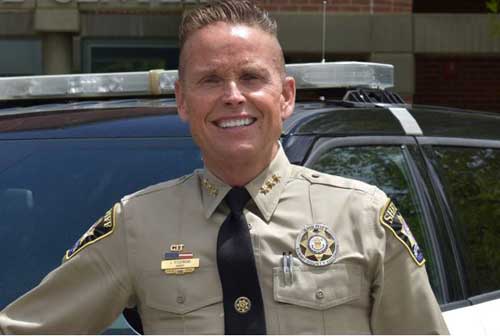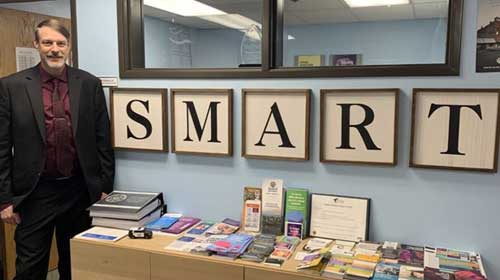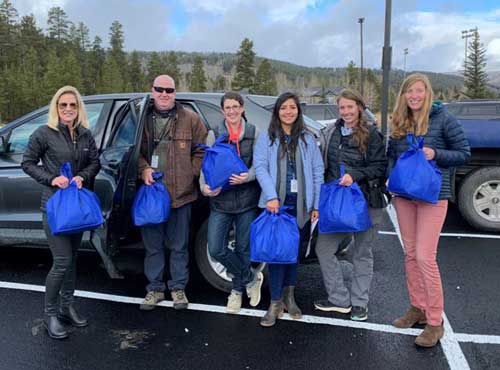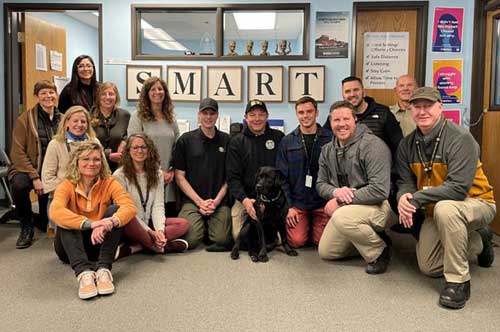The Summit County Sheriff’s Office covers Summit County, Colorado, which is an alpine environment. They are at the top of the Continental Divide, one hour west of Denver. The area encompasses several ski towns, including Breckenridge, Keystone, Arapahoe Basin, and Copper Mountain. There have about 30,000 residents, but every weekend the population swells to three or four times that.

Summit County Sheriff Jaime FitzSimons
Summit County has every crime anywhere else has, but maybe with a little less frequency. It is a vacation spot. So people come there to have a good time. There’s probably a significant amount of alcohol use that goes along with that. The State of Colorado also legalized marijuana.
It’s interesting to see someone from sea level who is used to having three drinks, which is normal for them. But at the high altitude in Summit County, consuming the same about of alcohol makes them very intoxicated, and it impairs their judgment. So the Sheriff’s Office receives a lot of calls that might be related to intoxication or drug use, like noise complaints and domestic violence.
Background
Daric Gutzwiller is a lieutenant with the Summit County Sheriff’s Office. In 2017 Summit County Sheriff Jaime FitzSimons knocked on Lieutenant Gutzwillers’ door to tell him that his father had committed suicide. The Lieutenant had been a law enforcement officer for 15 years and had been on hundreds, if not thousands, of suicide calls. Still, he was very ill-equipped to handle his father’s death. The Lieutenant and his father were very close, so it did affect him quite a bit. The Sheriff and the community helped him get through tragedy, and it emphasized the need for mental health services in their community.

Lieutenant Daric Gutzwiller
Summit County had a community mental health center; however, it was not providing adequate services. So much so that the state stepped in and removed some contracts from them. So they found themselves without a healthcare provider. That meant law enforcement was the defacto mental health provider. And clearly, they don’t have the training for that. However, their deputies do their best and have a lot of experience with crisis-type calls.
Summit County has a suicide rate that’s three times the national average. An interesting study published in National Geographic ties altitude to suicidality. Lt. Gutzwiller did a study of mental health calls in this Summit County and found that such calls have increased by 998% in the past 10 years. So there was an extreme need and no services. The Sheriff wanted to do something that benefited the community in the best way possible for people who experience mental health issues. So the Sheriff decided to bring this all in-house and start our their mental health resource and build it from the ground up as the community needed. It happened to be a pivotal time because the Sheriff’s Office had put in for a grant for mental health services. Lt. Gutzwiller became very interested in providing those services to the community after he lost his father. The Sheriff asked Lieutenant Gutzwiller to look at every mental health program he could find in Colorado and take back the parts he thought would work in Summit County.
Creation of the SMART Team
The SMART Team is an acronym for the System-wide Mental Assessment Response Teams. This is a specialized team designed from the ground up to deal with encounters where public safety and mental health are paramount.
Most of these calls deal with crises such as a homicidal and suicidal person. When calls come into their dispatch center, they are screened for factors that show a tie between public safety and mental health. There are SMART Teams on duty 20 hours a day, seven days a week. When a SMART Team hears a call for service that fits their criteria, that sounds like a mental health type call, they just go. They are in an unmarked unit, and they respond in plain clothes. This really mitigates some of the stigmas around mental health responses. There isn’t a firetruck show up or EMS. It’s an unmarked car with two plain-clothed people who knock on the door.

SMART Team members
A Team comprises two individuals, one being a deputy called the technician. One of their primary focuses is the safety and security of everyone involved. They make the initial contact to de-escalate the individual to a point where crisis intervention is possible and make that scene safe to introduce the clinician, the other team member. The clinician is a mental health expert, not a deputy, that has completed six years of study, and is licensed by the Colorado Department of Regulatory Agencies. They can be licensed professional counselors, clinical social workers, certified addiction counselors, or marriage and family therapists.
All of the team members are trained hostage negotiators. And they do significant cross-training, including clinical skills. The technicians on the team are a little more highly trained than the average deputy on mental health. Everything from pharmacology to conditions and diagnoses that are out there. They have a great sense of whenever it’s a good segway to introduce that clinician. When the clinician comes in, they perform a higher-level assessment. After making some introductions and investigating the initial issues, they will assess for suicidality, homicidal, or grave dis.
What to Improve Upon
According to Lt. Gutzwiller, what things used to look like for law enforcement was that when they were on a call, and someone was suicidal or having suicidal thoughts, when the deputy had done enough due diligence they would take them to the hospital. That means a person would typically be taken to the emergency room and placed on a mental health hold where they were held against their will for 72 hours. They may be forced medicated, they may be strapped to a bed, and during that time, they’re not receiving any level of mental treatment going on. They’re just waiting for a bed space to open somewhere else within the state they’ll ultimately be transported to, and then their treatment can start. This also creates a huge problem for that person whenever they get out of the hospital; now they have 20 or $30,000 hospital bill on the heels of their mental health crisis.
How the SMART Team Operates
Introducing a clinician right to the scene can stabilize people in place. They perform an assessment, and they work with the individual to get them calm and bring them into a place where they feel better. The team can put some safety factors in place, such as removing lethal implements from the residence. They may talk to the individual about taking them to their mom’s house for the night.

SMART Team members
Local providers hold two mental health appointments for the SMART program every day of the year for the expressed purpose of getting clients who have been stabilized in for treatment immediately. This is funded by Strong Futures, a local Mill Levy. So instead of the individual sitting in a hospital for three days waiting for treatment, they can be taken to a mental health appointment the next day or that day, depending on when the crisis was occurring. The individual gets five free appointments through that stabilization process with the ultimate goal of switching them over to local community partners who can give ongoing treatment.
If the initial field assessment determines that a higher level of care is needed, the team has direct placement options. That means instead of going to the hospital and waiting there for that bed space to open, the team can reach out to a number of facilities throughout the state and get them accepted for treatment immediately. The team can perform a reentry plan with the individual to have all the support they need when they come back into the community when their facility treatment is complete. In addition, the team will help navigate complex issues such as insurance and criminal justice cases. Another function of the team is to mitigate barriers to treatment so that people can get the help they need.
The Case Manager
After the initial event, the case manager is brought in to work with the individual. The case manager will work with a client for days, weeks, months, or even years. As long as the client has some mental health goals, the case manager will work with them for free to work through and mitigate some of the barriers to treatment. They act as a person that can take a temperature reading of that individual, checking in on them once a week to see how they’re doing.
The case manager will also work to find any issues the client faces and help them work through them. For example, one case manager worked with the Nicaragua Embassy to get a birth certificate for an individual because the inability to get a job without a birth certificate was one of the main motivating factors for their state of mental health. So if they need housing or have lost their job, there may be other things contributing to the situation that case management can help with. It could be as simple as a case where a woman wouldn’t go to treatment because she didn’t have somebody to water her plants. It required some problem-solving, So they had her bring her plants into the Sheriff’s Office, and they watered her plants for her, and she was good to go. Other people have had a dog they didn’t have a way to board.
As long as there’s a tie to public safety and mental health, the case managers will work with that person. They will be their advocate, going to their house, picking up medication for the person, and taking them to appointments. The case manager will do whatever is needed. The case manager is the third part of the team that does some heavy lifting after the crisis event. They all work together for the good of the client.
One of Many Success Stories
“Alex” is an 18-year-old who grew up in Summit County and had multiple interactions with Law Enforcement for many years. His grandmother had been his caregiver since he was eight years old. Unfortunately, Alex was on a path of early drug use, which complicated and worsened his existing mental health conditions. This family had been in contact with multiple agencies in the community in hopes that Alex would get the help he needed.

SMART Team members
SMART connected with Alex and his grandmother through his probation officer, who was having trouble engaging with him. Alex failed to go to school, missing over 100 days in less than four months. At this point, Alex was presenting significant delusions and paranoia. The case manager, probation officer, and a child welfare case worker started to collaborate to find a treatment center that would be willing to accept Alex. After many hours of searching, a treatment center was located, and Alex entered inpatient treatment. Alex entered a mental health facility, and during his 5th month, he shared: “I knew I was the only one who could change my situation. I had everybody telling me what I needed to do, but I just didn’t listen. I feel better now, and I want to be an inspiration to other kids that are going through the same.”
At the Mental Health Facility, Alex showed good behavior and was rewarded with “weekend passes.” This means he was allowed to return to the community on weekends and then return to treatment on Sundays. As a result, Alex graduated from High School and has returned to Summit County. His case manager helped him achieve employment, and he continued local mental health support. Alex is actively working on his recovery path and receives counseling and medication management.
Adding Two Full-time Sergeants
The Summit County Sheriff’s Office is in the process of adding two full-time sergeant positions to the SMART and are currently recruiting for those positions. The sergeants will provide a secondary line of cover when the call involves a person with a weapon, and two deputies are needed. The sergeants will be in plain clothes and unmarked units, so there can be two plain clothes deputies and two unmarked units responding to these types of calls. The following is the job announcement for these two sergeant positions.
Lt. Gutzwiller has worked with law enforcement agencies throughout the county on starting a program similar to that of Summit County. If anyone would like more information on starting a program similar to this, they can contact Lt. Gutzwiller at the Summit County Sheriff’s Office.
SMART is a collaborative project funded by Summit County Government and multiple grants from the Colorado Behavioral Health Administration, Strong Futures, SAMSHA, and Rocky Mountain Health Foundation.
.

 Joseph Libowsky,
Joseph Libowsky,